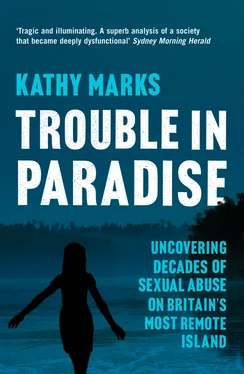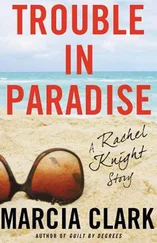Thirteen men had been charged as a result of a police investigation into child sexual abuse, and seven of them lived on Pitcairn, where they accounted for nearly half the adult males. Those men had insisted on their right to be tried at home; however, the last major court case on the island had been in 1898, when Harry Christian was convicted of murdering his wife and child. The island had no legal infrastructure, only a local court that had not been used for years, even for minor offences. On top of that, it had little accommodation and very few amenities.
All the key players—including judges, lawyers and court officials—were having to be shipped in, along with supplies to feed them for six weeks. British officials had chartered the Braveheart to carry everyone, together with their luggage, and a dozen crates of legal documents and evidence. With the trials due to start in four days, my group was on the boat’s final run.
After dropping anchor, we waited for the longboat, the only vessel which—unless conditions are exceptionally calm—can execute the tricky landing at Bounty Bay. The loaf-shaped island stretched out before us, silent and aloof, its shores hammered by the relentless waves. Bounty Bay, a small, rock-strewn cove, was a mere chink in an armour of tall cliffs that enclosed Pitcairn almost completely. The island was surprisingly green, with thick vegetation and ochre-red rock exposed by gashes in the escarpments.
The Braveheart hovered. Ten minutes passed. Then another ten. We chatted and joked, affecting a nonchalance that none of us felt. We scanned the scene ahead. The smile on the face of Matthew Forbes, the British diplomat with day-to-day responsibility for the territory, looked strained. Surely the islanders wouldn’t refuse to bring the boat out?
I knew that many of the locals were deeply resentful about the trials, and the consequent influx of strangers to the island. The Pitcairners were protective of their privacy and turned down most requests to visit; if the British diplomats and police officers on the Braveheart were undesirable guests, the media representatives were perhaps even less welcome. Touchy about the way they had been depicted by writers and film-makers, the islanders had more or less banned journalists since the publication in 1997 of a travel memoir, Serpent in Paradise , a closely observed study of Pitcairn life, which they detested, along with its English author, Dea Birkett.
I had been given a flavour of what lay in store for us after emailing Mike ‘Cookie’ Warren, one of the more outspoken islanders, while we were en route . I asked Cookie how the community felt about the impending trials, and expressed the hope that we journalists would be able to present a balanced picture. Cookie replied, ‘Let me begin by asking you why you are coming here when you don’t have permission from the islanders? Let me suggest that you are no different to any other reporter and journalist I know. That is, most are out to print what sells and to make money. I couldn’t care less whether what you report is balanced or not. We have already been humiliated and the presence of the press pool will only serve to reinforce that fact further.’
He added, ‘A family in trouble best deals with its troubles and problems privately and discreetly. How would you like it if your family disputes were aired on television for the whole world to see? Would you call this justice?’
The stand-off, if that was what it was, ended abruptly. A boat materialised in the distance, slicing through the waves at a hectic pace, and a few minutes later drew up beside us with a flourish. A fearsome-looking figure was planted on the prow: hulking and shaven-headed, with a bandana, a shark’s tooth necklace and several dozen earrings and studs. It looked like a pirate; it was, in fact, Pawl Warren, whom we would come to know as one of the nicest men on the island.
Randy and Jay, the two defendants, watched impassively as others helped us aboard, stowing our baggage beneath a tarpaulin. There was an awkward silence as we sat down. What does one say in that situation? ‘Hello Jay, hello Randy, hope your trial goes well’? Among the boat’s other occupants I recognised Tom Christian, tall and rangy, in a battered Panama hat: he had been Pitcairn’s radio operator for decades.
The longboat bounced off across the breakers. No one spoke to us; most of the islanders kept their gazes firmly averted. I felt ill at ease, and I sensed that my colleagues—all seasoned operators, some with experience in war zones—did too. Soon we were approaching Bounty Bay, where we shot in through a narrow entrance after veering sharp left to dodge some nasty-looking rocks.
Our reception party was modest and consisted mainly of outsiders. A handful of Pitcairners, including Tom Christian’s wife, Betty, were waiting on the concrete jetty; one or two others stood at the far end, well away from the boat, and they left after photographing our arrival. We clambered ashore and milled around uncertainly, amid the bustle of greetings and boxes being unloaded. Jay and Randy, still at work, winched the longboat up a slipway and into the boatshed, which was crowned by a big sign stating ‘Welcome to Pitcairn Island’. Another sign pointed to the ‘last resting place of H.M.S Bounty’—the spot where the skeleton of the ship, which the mutineers scuttled and burnt, lies submerged in shallow water. Long-beaked frigate birds flapped overhead, swooping down to seize fish guts from the outstretched hand of an islander who was cleaning her catch.
Snatches of the locals’ curiously cadenced language drifted over to us. Pitkern reflects their mixed roots, combining the sailors’ 18th-century English with some Tahitian words. Others around us were speaking English, but with the characteristic drawl of England’s West Country. The origins of that accent are something of a mystery.
A couple of us briefly interviewed Tom, who declared, ‘I can’t wait to get this whole mess behind us.’
Then it was time to move, and that meant up.
Pitcairn, the tip of an extinct volcano, has little flat land. Overshadowing The Landing, as it is known, is a 300-foot cliff, at the top of which Adamstown, the one settlement, crouches on a slender plateau. It is reached via a steeply winding track, aptly called the Hill of Difficulty, which in 2004 was still ferociously rutted and suitable only for quad bikes, the sole vehicles used on the unsealed roads. A dozen quad bikes were parked near the jetty, like a herd of exotic animals congregating around a waterhole. I climbed onto the back of one driven by the island’s New Zealand doctor.
I took the doctor for an islander and he did not enlighten me, apparently enjoying a little game of who’s who. As I tried to draw him into conversation, we passed a pink bulldozer on a hairpin bend; inside it was a dark-haired man with a moustache and swarthy features, who was busily repairing a stretch of road. I did not realise then, but it was Steve Christian—Randy’s father, mayor of Pitcairn, and the principal defendant in the child abuse trials. Steve had not been on the longboat, nor at The Landing. But there he was, watching events from on high and asserting himself as a person of importance as he carried out vital maintenance work completely unconnected with our arrival.
The quad bike laboured uphill, with spectacular views of the bay unfolding beneath us. At the top, the ground suddenly levelled out, and we forked right along the ‘main road’, a dusty red trail that snakes through the village, fringed by a dense tangle of bush—hibiscus, frangipani, banana and coconut palms, pandanus trees, bamboo and towering banyans. Turning down a side lane, we headed back towards the ocean, and after passing a cemetery stopped outside the Government Lodge, the rather grandly named dwelling allocated to the media.
Читать дальше












